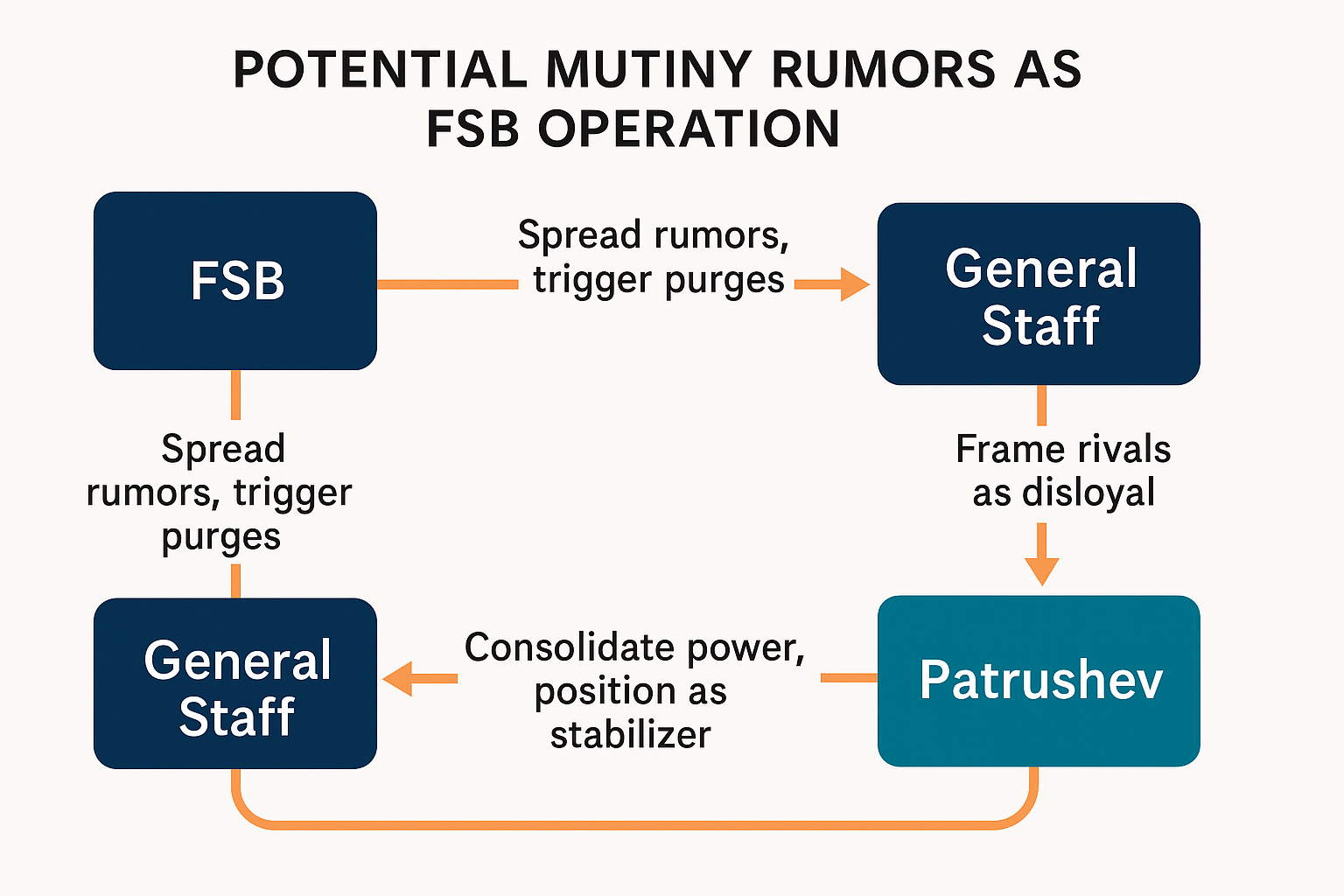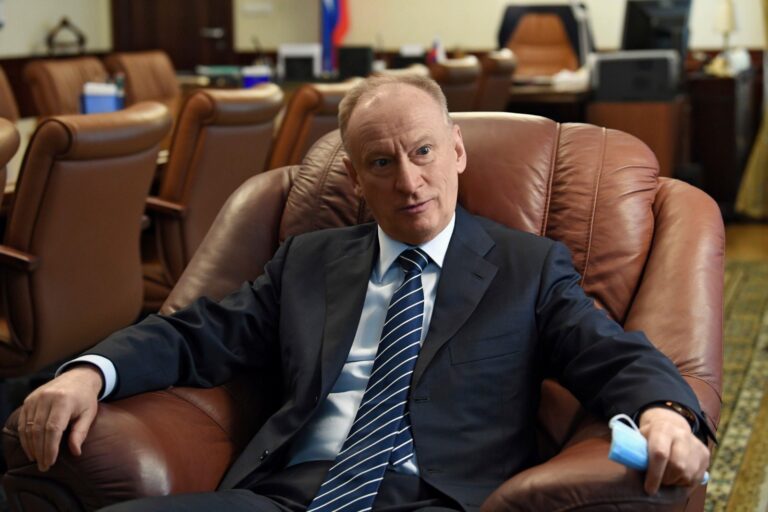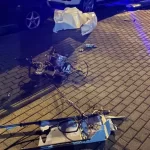Recent unverified claims from Russian sources suggest that certain officers within Russia’s General Staff are allegedly considering a coup-style operation, fearing repression or purges if the war in Ukraine ends unfavorably. Inspired by the failed mutiny of Yevgeny Prigozhin in 2023, these actors reportedly view a limited, swift power seizure as a potential survival mechanism. This report evaluates the credibility of these claims, identifies plausible actors, and assesses the likelihood and possible outcomes of such a scenario.
2. Context: Coup Anxiety in the Russian Security Apparatus
Following the extended and costly war in Ukraine and mounting economic, military, and diplomatic pressures, intra-elite fractures are growing more visible. Past patterns in Russian history show that when regime stability is questioned—especially after military failures—paranoia within the security elite rises, leading to purges or preventative action.
Key context elements:
- Prigozhin’s mutiny (June 2023) exposed serious cracks in Russia’s command and control system.
- Since then, numerous generals and colonels have been dismissed, arrested, or disappeared.
- A potential defeat or frozen conflict in Ukraine could be seen as betrayal by the Kremlin, triggering internal scapegoating.
- The FSB and Presidential Guard have reportedly increased surveillance on senior officers.
3. Credibility Assessment
| Indicator | Evaluation |
| History of purges post-failure in Russian/Soviet military history | High plausibility |
| Previous armed dissent (Prigozhin mutiny) | Precedent exists |
| Fear of post-war repression among officers | Consistent with leaked chatter |
| Open-source corroboration | Low (as of now) – mostly confined to rumor networks |
| Russian media/information environment | Strongly controlled, hard to validate independently |
Assessment: Medium credibility. While unconfirmed, the logic behind the fear of repressions and coup contingency planning fits historical Russian behavior patterns. However, the lack of public-facing signals from top generals tempers the assessment.
4. Possible Actors Behind the Scenario
If such planning were real, it would likely involve mid-to-upper tier officers rather than the top leadership directly under Putin’s control.
Potential Figures or Factions:
| Figure / Group | Background & Motivation |
| Lt. Gen. Andrei Sychevoi (example) | Recently rumored to have been sidelined; experience in Ukraine war. Could fear arrest. |
| Surviving Wagner-linked elements within MoD | May still harbor anti-Shoigu/anti-Gerasimov sentiment. |
| Colonels and deputy commanders | More operational autonomy, greater vulnerability to scapegoating. |
| Exiled or retiring generals (e.g., General Surovikin supporters) | Could have networks still inside active units or security services. |
Note: These are speculative based on current purges and patterns; names are illustrative.
5. Likelihood of Coup Success
Advantages for Coup Plotters:
- Precedent: Prigozhin’s march on Moscow showed that loyalty can fracture.
- War fatigue: Parts of the security and military elite are demoralized.
- Security dispersal: Regional command centers might be exploitable during distraction.
Obstacles to Success:
- FSB control and surveillance over General Staff is extremely high.
- Kremlin loyalists occupy top positions (e.g., Gerasimov, Bortnikov, Zolotov).
- No independent media or civic support for a coup to gain legitimacy.
- Rapid response capacity of National Guard and Chechen units.
Assessment: Low probability of success without a major catalyst (e.g., Putin death, mass military defeat). However, localized mutinies or assassination attempts cannot be ruled out.
6. Strategic Implications
| Scenario | Implication |
| Full-scale coup attempt fails | Harsh purges, tightening of command structures, broader repression |
| Coup succeeds in part (e.g., regional control) | Civil strife, fragmentation, possible external intervention risk |
| No coup, but purge continues | Military professionalism deteriorates, morale collapses |
| NATO response | Heightened alert, risk reassessment, potential contingency planning |
7. Recommendations for Monitoring
- Track dismissals or deaths of high-ranking officers not explained by combat.
- Observe Kremlin body language: increased appearances with Shoigu/Gerasimov, sudden replacements.
- Western intelligence sharing: Collaboration with defectors or insiders may provide early warnings.
The idea of a coup from within Russia’s General Staff is not implausible—but remains speculative and fragile in terms of execution. The most likely outcome, if any, would be internal destabilization or isolated defiance, not a full regime change. Still, the mere discussion of such plans within Russian military circles reflects growing anxiety and erosion of internal unity, especially as the war’s end approaches.
The fact of a mutiny in Russia’s General Staff, if confirmed, would be a watershed moment in Russian political and military history. It would signal not just dissatisfaction—but the collapse of elite consensus within the very structure designed to uphold the regime.
Here’s what it would mean, broken down analytically:
1. Collapse of Core Regime Cohesion
The General Staff is one of the most loyal, hierarchical, and tightly controlled institutions under the Kremlin. A mutiny there would mean that:
- Even the highest levels of command no longer believe in the regime’s stability or its post-war plans.
- The chain of command is broken, which undermines the legitimacy of all military orders.
- The system of coercion and control (FSB surveillance, purges, rewards) is failing to ensure loyalty.
Implication: Putin would no longer be able to rely on the military as a monolith; trust between institutions would erode.
2. Fear of Repression Has Surpassed Fear of Loyalty Breach
If officers mutiny out of fear of post-war purges, it means that they:
- Anticipate a Stalin-style scapegoating campaign after the war,
- Believe that passivity equals prison (or worse),
- Think acting preemptively is the only survival strategy.
This reflects a toxic, paranoid internal climate within the Kremlin’s security core.
3. Russian Military Doctrine Fatally Compromised
A mutiny inside the General Staff would break the Russian military’s ability to:
- Conduct coherent wartime operations,
- Maintain strategic secrecy (as factions leak info to external actors),
- Uphold nuclear command and control credibility.
NATO and other external powers would immediately reassess Russia’s internal stability and nuclear security posture.
4. Opportunity for External and Internal Actors
- Wagner-type units, nationalist militias, or even Chechen forces might try to exploit the split for their own power ambitions.
- The West may intensify information warfare, disinformation, or support for democratic alternatives.
- China could intervene quietly to shape succession plans, especially if Russian instability threatens border stability.
5. Strategic Paralysis or Civil Conflict
- A mutiny doesn’t have to succeed militarily to paralyze governance. Just fear, leaks, or temporary disobedience can stop major decisions.
- If multiple factions emerge (e.g., pro-Putin, nationalist-military, ex-Wagner remnants), Russia risks a Yugoslavia-type scenario, with fragmentation or regionalism.
6. End of Putin’s Aura of Infallibility
A successful or even attempted mutiny at this level would shatter the image of:
- Putin’s iron control over the armed forces,
- The myth of FSB omnipotence,
- The belief that the elite prefers stability to change.
In Russian elite culture, perceived weakness is fatal—and once blood is in the water, more ambitious actors might follow.
Bottom Line:
A mutiny inside the General Staff wouldn’t just be an operational crisis—it would represent a fundamental loss of regime legitimacy, a fracture in elite loyalty, and a potential prelude to civil or systemic collapse.
It is entirely possible—and plausible—that the rumors of a General Staff mutiny are part of an FSB disinformation or control operation designed to:
- Enhance Nikolai Patrushev’s position;
- Preemptively neutralize “untrustworthy” generals; Consolidate power ahead of a post-war succession crisis.
1. Why the FSB Would Orchestrate Such a Narrative
The FSB is not just a security organ—it is a political actor. Its objectives often include:
- Shaping internal narratives to justify purges;
- Creating a climate of fear that deters dissent;
- Promoting allies (e.g. Patrushev) as irreplaceable stabilizers;
- Testing the loyalty of key military actors.
By leaking or manufacturing coup rumors, the FSB can frame the General Staff as a “threat,” giving cover to remove or weaken them.
2. Patrushev’s Interest in the Scenario
Nikolai Patrushev (Secretary of the Security Council, ex-FSB director) is:
- One of Putin’s most trusted hardliners;
- Strongly aligned with the Siloviki clan (FSB, GRU, Rosgvardiya);
- Seen by many as a possible “gray cardinal” successor or regime anchor if Putin weakens.
He could use such a narrative to:
- Discredit Shoigu’s circle and rivals in the General Staff;
- Justify a reorganization of military leadership under Security Council oversight;
- Portray himself as the guardian of regime stability;
- Win support from conservative factions and hawks in the Kremlin.
This is classic “power vertical” warfare: destroy a rival by suggesting they are about to betray the throne.
3. Tactics Consistent with FSB Operations
The FSB has a long history of:
- Staging false flag operations to rally loyalty (e.g., 1999 apartment bombings);
- Spreading internal kompromat to eliminate threats;
- Running provocation operations against generals and oligarchs (e.g., the Prigozhin narrative was partly shaped by leaks).
Leaking “mutiny rumors”:
- Allows them to test the loyalty of suspected officers;
- Triggers fear that FSB knows everything, reinforcing psychological control;
- Justifies new waves of surveillance, arrests, or “accidents.”
4. Risks of the Operation
If this is indeed an FSB op:
- It risks destabilizing military cohesion, especially amid battlefield pressure;
- May backfire if officers truly believe they are already targets, leading to real disobedience or defection;
- Could accelerate infighting among siloviki clans (e.g., FSB vs. GRU vs. MoD), fragmenting regime power.
5. Patrushev’s Long Game
If the mutiny narrative originated or is amplified by the FSB, it may reflect a long-term strategy to clear the chessboard before a post-Putin succession—and to position Patrushev as the indispensable handholding the state together.





